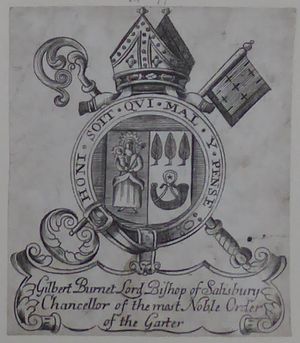Difference between revisions of "Gilbert Burnet 1643-1715"
| Line 29: | Line 29: | ||
[[Category:Libraries Sold at Auction]] | [[Category:Libraries Sold at Auction]] | ||
[[Category:Bookplates and Labels]] | [[Category:Bookplates and Labels]] | ||
| + | [[Category:All Owners]] | ||
Revision as of 04:15, 23 July 2020
Gilbert BURNET 1643-1715
Biographical Note
Born in Edinburgh, son of Robert Burnet, judge of the court of session. MA Marischal College, Aberdeen 1657. Travelled in England and on the continent in the early 1660s before becoming minister at Saltoun, near Edinburgh in 1665, until moving to the University of Glasgow as Professor of Divinity in 1669. Involvement in Scottish ecclesiastical affairs, publications, and the patronage of the Dukes of Lauderdale and York raised his profile and he moved to London in 1674. He became chaplain to the Rolls Chapel, and lecturer at St Clement Danes, in 1675. The publication of the first volume of his History of the Reformation (1679), coinciding with the Popish Plot, brought him wide acclaim and a DD from Oxford. He was out of favour in the 1680s with both Charles II and James II, and he lived on the continent 1685-88 until returning with William of Orange as his chaplain. He was made Bishop of Salisbury in 1689 and was actively, and often controversially, involved in ecclesiastical affairs at both diocesan and national level for the rest of his life, despite being often out of favour with monarchs. He was a voluminous publisher of historical, theological and political works throughout his life and his autobiography (History of his own time, published posthumously 1724-34) continued to demonstrate his skills in attracting attention and reputation through his writings.
Books
Burnet directed in his will that his library should be sold by auction after his death, except for some small specific bequests to his children (mostly special copies of Bibles and prayer books). He also set up charitable endowments in Saltoun, including a school, and an annual allowance of 50 marks a year to augment “the library began for the minister’s house”. He left all his papers to his son Gilbert, including the manuscript autobiography, with instructions that it be printed verbatim, but not until six years after his death (the ms is now British Library Add ms 63057a-b).
The auction sale was held in London by Thomas Ballard, 19 March 1716. The catalogue included 2650 lots, plus 154 volumes of bound pamphlets and 11 volumes of “very ancient English tracts” (i.e. 16th century English pamphlets). It was divided between Latin theology (534), Latin miscellaneous (including history, philology, law, classics, philosophy, geography and lexicography (600), French and Italian books (544), Spanish and Italian (57), Belgian (24), English theology (481) and English miscellaneous (410). The high proportion of European language books reflects his time spent abroad. Examples: Shrewsbury School B.III.8, P.III.9; Quaritch 1199 (1994)/22.
Characteristic Markings
Burnet used an engraved bookplate (Franks 4460/*597).
Sources
- Will of Gilbert Burnet, The National Archives PROB 11/545/168.
- Alston, R. C., Inventory of sale catalogues ... 1676-1800, St Philip, 2010.
- Bibliotheca Burnetiana, London, 1716, ESTC t10264.
- Gambier Howe, E. R. J. Franks bequest: catalogue of British and American book plates bequeathed to the ... British Museum. London, 1903.
- Greig, Martin. '"Burnet, Gilbert (1643–1715), bishop of Salisbury and historian."' Oxford Dictionary of National Biography.
- Wolf, E., Some books of English provenance in the Library Company of Philadelphia, The Book Collector 9 (1960), 275-284, p.281.
